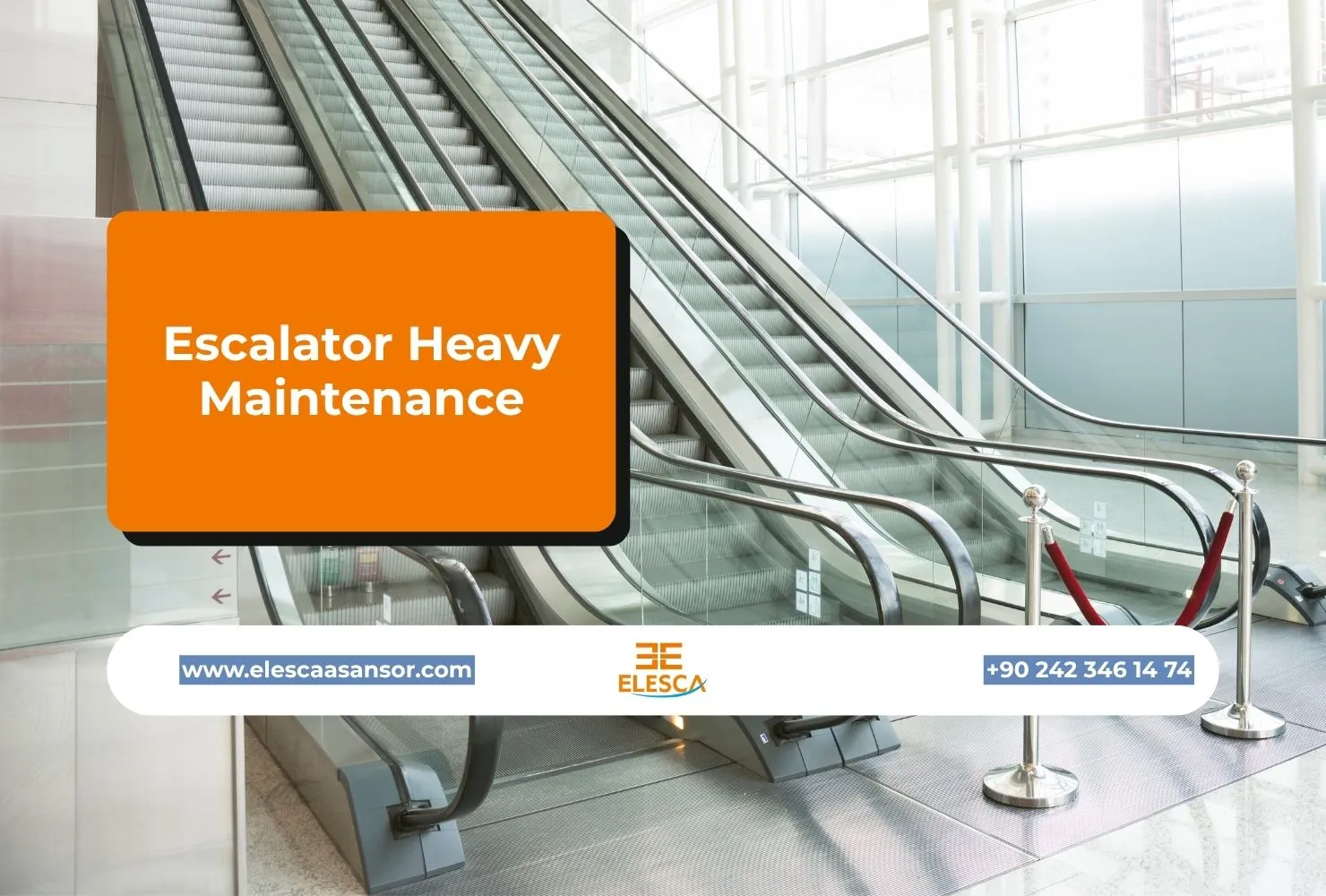
Escalator Heavy Maintenance
Why Escalator Heavy Maintenance Matters
At Elesca Elevator & Escalator Systems, based in Antalya, we supply high-quality escalator spare parts to both domestic and international markets. Our products include escalator handrail, pulley, step roller, step chain, comb plate, escalator control panel, step, C return chain, handrail inlet cover, and step skirting.
Neglecting maintenance or performing only minimal checks can cause parts to wear prematurely, create safety risks, and result in costly repairs. This is why escalator heavy maintenance is essential. In this guide, we will explain what heavy maintenance is, the steps it involves, and why regular implementation is crucial.
- What is Heavy Maintenance?
Heavy maintenance goes beyond daily or monthly inspections. It involves deep, comprehensive checks, repairs, adjustments, and, when necessary, replacement of critical components.
- Periodic inspections identify hidden wear and tear.
- Essential parts such as step chain, handrail, and step roller are examined and replaced if needed.
- Safety systems, including comb plate mechanisms and step safety switches, are tested and adjusted.
- Electrical control panels, braking systems, and motor components are checked and serviced.
In short, it is not just maintenance—it’s a strategy to extend lifespan and optimize performance.
- When Should Heavy Maintenance Be Performed?
The schedule for heavy maintenance depends on factors like traffic, age, and environmental conditions:
- For high-traffic areas (shopping malls, airports, metro stations), heavy maintenance is recommended at least once a year.
- Standard inspections are typically monthly, but heavy maintenance should occur annually or semi-annually.
- Older escalators (10+ years) or those with upgraded safety standards may require more frequent checks.
- Heavy maintenance may also be triggered by unexpected breakdowns or safety warnings.
- Key Components Checked During Heavy Maintenance
Heavy maintenance focuses on critical components. The main areas include:
3.1 Step Chain
- Tension and alignment are checked.
- Pins and wear are inspected; replacement occurs when necessary.
3.2 Step Roller
- Rollers and shafts are examined.
- Bearings are lubricated, and worn parts replaced.
3.3 Escalator Handrail
- Full rotation of the handrail is inspected.
- Cracks, cuts, and grip issues are addressed.
- Safety switches are tested for proper functioning.
3.4 Comb Plate & Safety Systems
- Comb plates are removed and checked; broken teeth are replaced.
- Safety switches are tested to ensure the system stops under pressure.
- Gap measurements are adjusted to standard tolerances.
3.5 Motor, Brake, and Gear Mechanism
- Motors, brushes, and commutators are inspected and cleaned.
- Brake systems are tested and adjusted.
- Gear components are lubricated to prevent premature wear.
3.6 Control Panels & Electrical Circuits
- Control boards, circuits, and fuses are inspected.
- Emergency stop buttons and main safety switches are tested.
- All electrical connections are tightened and cleaned.
3.7 Structural Inspection & Cleaning
- Truss interiors, underside of steps, and panels are cleaned.
- Corrosion, cracks, or deformations are identified.
- Oil leaks, seal integrity, and gasket conditions are checked.
- Heavy Maintenance Process: Steps & Methodology
- Planning & Preparation
- Schedule maintenance based on traffic and equipment age.
- Ensure spare parts (step chain, handrail, comb plate) are available.
- Implement safety measures and train technicians.
- Execution
- Escalator is powered down.
- Steps, comb plates, and handrails are systematically removed.
- Components are inspected, repaired, lubricated, and tested.
- Safety systems are individually tested.
- Quality Control & Testing
- Escalator is reassembled and operated.
- All safety switches are tested: emergency stop, step lock, and handrail safety.
- Comb plate gaps are measured.
- Handrail rotation is checked.
- Documentation
- Every step is documented for future reference.
- Issues identified and repairs performed are logged.
- Reports guide future maintenance planning.
- Benefits of Heavy Maintenance
5.1 Safety Enhancement
Heavy maintenance reduces safety risks by detecting worn components such as broken chains, worn rollers, and damaged comb plates early.
5.2 Preventing Breakdowns & Ensuring Continuous Operation
Comprehensive checks prevent unexpected downtime and costly repairs.
5.3 Extending Equipment Lifespan
Regular maintenance extends the life of step chains, handrails, and step rollers, reducing replacement frequency.
5.4 Cost Efficiency
Early intervention lowers the financial impact of major breakdowns.
5.5 Compliance with Standards
Heavy maintenance ensures adherence to regulatory and industry standards.
- Elesca Elevator & Escalator Systems’ Role
At Elesca Elevator & Escalator Systems, we provide:
- High-Quality Spare Parts: OEM-compatible step, step chain, pulley, comb plate, handrail, and other components.
- Expert Technical Team: Skilled technicians follow safety-first procedures.
- Documentation & Reporting: Detailed maintenance reports with recommendations for future care.
- Customer-Oriented Scheduling: Maintenance plans tailored to traffic and usage.
- Domestic & International Service: Serving clients both in Turkey and abroad.
- Recommendations for Facility Managers
- Regular Audits & Planning
Schedule heavy maintenance according to traffic and usage patterns. - Daily / Weekly Checks
Operators should inspect step chain tension, handrail condition, and safety switches. - Cleaning & Lubrication
Dust and debris accelerate wear; regular cleaning reduces maintenance frequency. - Document Everything
Keep detailed records of all inspections, tests, and repairs. - Rely on Professionals
Partner with companies that provide expertise, spare parts, and robust safety procedures.
- Conclusion
Escalator heavy maintenance is more than a routine task—it’s a strategy to ensure safety, performance, and longevity. It helps prevent accidents, reduces unplanned downtime, and extends the lifespan of critical components.
Elesca Elevator & Escalator Systems, based in Antalya, provides expert heavy maintenance services and high-quality escalator spare parts. Our process is thorough, safe, and well-documented, making us a reliable partner for escalator care.
For professional escalator heavy maintenance services or spare parts, contact us today at +90 242 346 14 74.
Remember: Proper maintenance ensures a safe and long-lasting escalator experience. Trust Elesca Elevator & Escalator Systems to keep your equipment running at peak performance.



